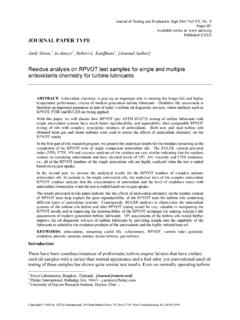Transcription of Getting down to business with our Advanced …
1 Getting down to business with our Advanced management programme (NQF 7). NORTH-WEST UNIVERSITY. POTCHEFSTROOM YUNIBESITI YA BOKONE-BOPHIRIMA. BESIGHEIDSKOOL NOORDWES-UNIVERSITEIT. business SCHOOL POTCHEFSTROOM CAMPUS. Advanced management programme (NQF LEVEL 7). In a dynamic and highly competitive environment, it is essential that effective managers keep one step ahead of the average manager with updated knowledge and skills. By being on top of the latest developments and seeing challenges as opportunities, they can operate as successful modern managers in a challenging economy.
2 The Potchefstroom business School (PBS) has seen this as a challenge and has positioned itself strategically to constructively contribute to the growth and development of South Africa through research and people development. The aim of the programme is to present Advanced management training as an extension of the Middle management programme . The development of skilful top-level managers in a highly competitive environment is imperative to the success of any company. The Advanced management programme appropriately equips middle and top-level managers to face the dynamic environment in which organisations find themselves.
3 The programme runs over a period of one academic year, consisting of two study schools and a strategic management project. The programme is presented at the Vaal Triangle Campus of the North-West University in Vanderbijlpark. programme OBJECTIVE. The tremendous shortage in skilled and trained labour in South Africa has become one of the more serious problems of the South African economy. This problem is enhanced by the lack of properly trained top and middle managers in the industry. The objective of the programme is to provide sound academic and professional training to top and middle managers in South Africa.
4 Participants will not only be trained in their field of specialisation, but will also be subjected to a broad field of functional management . Functional co-ordination or integration is emphasised in this programme . The programme concludes with a strategic management project. The aim is to equip top and middle managers with the knowledge of the role of top management and their own role in the formation and implementation of business policy. Vertical co-ordination and communication are accentuated. TRAINING METHODOLOGY. To enable participants to gain the maximum benefit from the PBS philosophy, a training structure has been designed to enhance contact between lecturer and participant on the one hand, and contact between participants on the other hand.
5 A part-time training programme requires a large degree of independent study and work from participants. The importance of group decision-making, as spelled out in modern management approaches, necessitates the stimulation and application of this technique in training. Participants are therefore teamed into syndicate groups. Only the student can utilise the training structure established by the PBS. to his/her benefit. In order to gain maximum benefit from this structure, participants should be devoted. The training methodology is divided into three main components: 1.
6 Residential training (lecturer/participant contact). Two full-time study schools of one week each, spread over a period of 12 months, are presented to enhance intensive contact between lecturers and participants. Study schools comprise formal lectures, group discussions, case studies, workshops and skills training. 2. Work in syndicate groups (participant/participant contact). The training is aimed at group decision-making. Participants are allocated to syndicate groups of between five and eight people. Syndicate groups determine their own work programme , but should meet at least once a week.
7 A strategic management project is to be handed in by each group. A liaison officer will be appointed by the PBS for each group. Group interaction enhances the learning experience and the PBS will attempt to form multidisciplinary groups in order to facilitate group interaction and cross-pollination. Assignments are thus compiled in such a manner that students must mutually utilise each other's knowledge in order to benefit synergistically. 3. Self-tuition The importance of group decision-making has been pointed out. A group, however, is only as good as the synergistic sum of its members.
8 The development of the individual is seen as a high priority in the training programme . The prescribed reading and study programme has been designed to guide the student through a structured learning experience. Devotion and self-tuition are of cardinal importance to the development of the participant. CONCISE DESCRIPTION OF COURSE CONTENTS. Study topics STUDY SCHOOL 1 STUDY SCHOOL 2. Formulation of Strategy Formulation of Strategy Strategic management Project Strategic management of Change Strategic Financial Support Implementation of Winning Strategies Strategic Marketing Support Strategic Leadership Strategic Innovation and Entrepreneurship Labour Relations, Structure and Strategy Strategic Action Plans and Projects Applied E- business Strategy Strategic management project Each syndicate group must choose an enterprise and do an analysis of this enterprise according to the following guidelines.
9 These guidelines are not necessarily complete and may be enhanced by your own work. You should be careful not to choose an enterprise that is too large or too small. The objective of the strategic management project is to do a comprehensive analysis of the chosen enterprise. This analysis should serve as the foundation of future planning. The project should be done in such a way that it can be presented to the top management of the enterprise. You are expected to: Present a comprehensive strategic plan for the enterprise After the development of the strategic plan, develop the different functional strategies for the enterprise must be developed Also indicate how you will implement the strategy, which includes, inter alia, organisation structure and management systems Formulation of strategy The purpose of the module can be summarised in four objectives.
10 To equip participants with the most important theoretical principles of strategic management To illustrate the practical application of these principles by means of practical applications and case studies To serve as integrative framework for the other (functional) study areas of management and leadership covered in the programme To guide participants through the formulation and implementation of strategy aspects required for the preparation of the strategic management project Strategic financial support On completion, the participant will be able to: Analyse and interpret financial statements (ratios).




